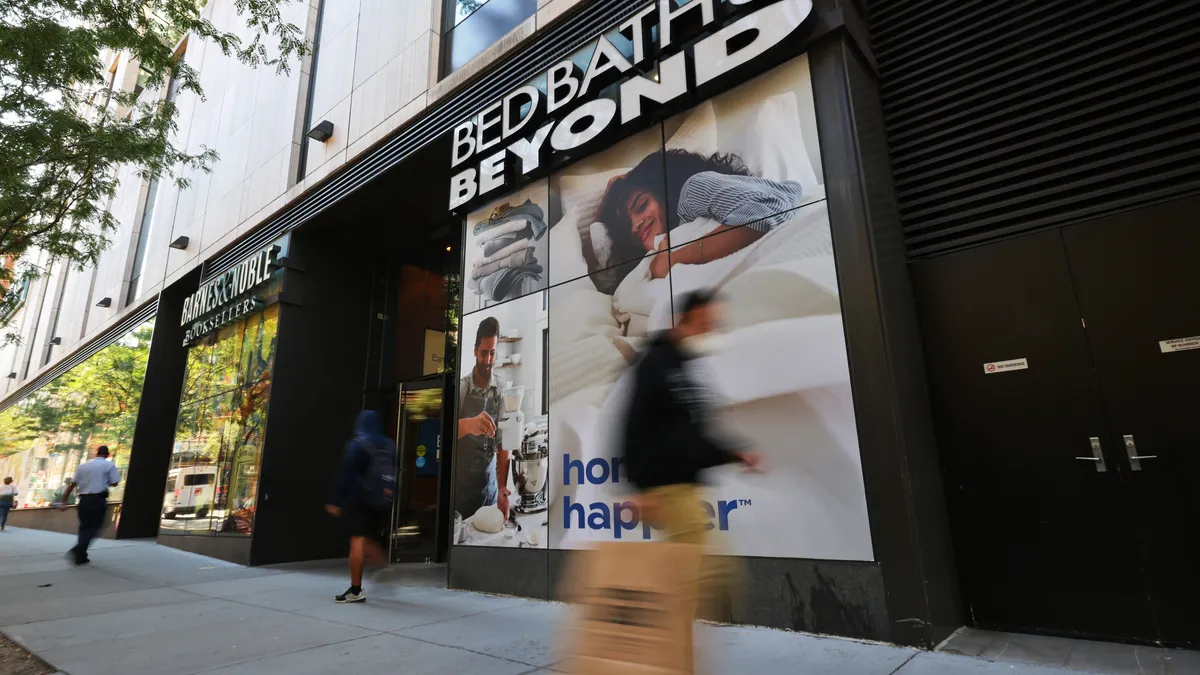The public feud between President Donald Trump and Amazon CEO Jeff Bezos is nothing new if you've been keeping track of Trump's tweets over the years. But on Wednesday, more bad blood spilled between the two leaders and shares of Amazon fell 4.4% on Wednesday, wiping out shareholder value of roughly $31 billion, after the publication of a story in Axios.
The report held that five anonymous sources had discussed Amazon with Trump and said the president was "obsessed" with the company and has wondered out loud if he could, "go after Amazon with antitrust or competition law." The report further detailed that Trump's wealthy friends say Amazon is crushing their businesses, including shopping malls and brick-and-mortar retailers, according to the sources. Further, these sources said Trump tells people Amazon has gotten a free ride from taxpayers and cushy treatment from the U.S. Postal Service.
Amazon did not respond to a request for comment from Retail Dive.
In response to a question asked during a press conference regarding whether the White House is considering an internet sales tax or other ways of going after Amazon, White House Press Secretary Sarah Huckabee Sanders said there were "no specific policies on the table at this time." In a tweet Thursday morning, Trump affirmed his concerns over Amazon on taxes, its effect on the brick-and-mortar retail business and relationship with the postal service.
I have stated my concerns with Amazon long before the Election. Unlike others, they pay little or no taxes to state & local governments, use our Postal System as their Delivery Boy (causing tremendous loss to the U.S.), and are putting many thousands of retailers out of business!
— Donald J. Trump (@realDonaldTrump) March 29, 2018
Last summer, Treasury Secretary Steven Mnuchin noted that the administration may take "a position" on Amazon's tax collection policy, specifically as it relates to its marketplace sellers, who currently do not collect and remit sales taxes in most states. In February, he reaffirmed at a House Ways and Means Committee hearing that the administration wants to institute an e-commerce tax.
The Axios report suggests the Trump administration is looking at Amazon on several thorny fronts, including on tax, antitrust issues.
Will Trump crack down on internet sales taxes?
Dating back to at least 2015, Trump has called out Bezos on Twitter on tax policy issues. That year, Trump tweeted that Bezos bought The Washington Post (in 2014) "for purposes of keeping taxes down at his no profit company."
Just last summer, he affirmed that perspective, adding flame to fire by calling Amazon a "no-tax monopoly" and later siding with retailers and blasting the e-commerce giant for killing jobs. Top retail CEOs have developed a fairly good relationship with the president, meeting with him at least once last February to express concern over the border adjustment tax, which was ultimately taken out of the final tax bill passed at the end of 2017.
The @washingtonpost, which loses a fortune, is owned by @JeffBezos for purposes of keeping taxes down at his no profit company, @amazon.
— Donald J. Trump (@realDonaldTrump) December 7, 2015
Is Fake News Washington Post being used as a lobbyist weapon against Congress to keep Politicians from looking into Amazon no-tax monopoly?
— Donald J. Trump (@realDonaldTrump) July 25, 2017
Amazon is doing great damage to tax paying retailers. Towns, cities and states throughout the U.S. are being hurt - many jobs being lost!
— Donald J. Trump (@realDonaldTrump) August 16, 2017
In February, Matthew Gardner, a senior fellow at the Institute on Taxation and Economic Policy, reported that Amazon paid zero federal income taxes on roughly $5.6 billion of profit earned in 2017, due to "various tax credits and tax breaks for executive stock options." On top of that, Amazon anticipates $789 million in benefits thanks to the new tax bill, which lowered the corporate tax rate from 35% to 20%. According to that report, Amazon has only paid a corporate tax rate of 11% over the last five years ultimately "sheltering more than two-thirds of its profits" over that period.
The issue of state sales tax has also come to a head as The Supreme Court of the United States aims to hear oral arguments on the online sales tax debate next month in the case of South Dakota v. Wayfair, Inc. Since a 1992 Supreme Court precedent ruling on Quill Corp. v. North Dakota, online retailers have only been required to collect and remit sales tax in states where they have a physical presence, a standard South Dakota is hoping to strip away in favor of a law that would instead require state sales tax collection and remittance if an online seller does more than $100,000 worth of business or processes more than 200 transactions in the state.
States could be losing between $8.5-$13 billion in uncollected taxes, according to a report published in November by the United States Government Accountability Office. But the issue is certainly not all about going after Amazon.
In fact, as a retailer, Amazon has collected and remitted state sales tax in all states since April of last year — in no small part because as the retailer has grown, it has expanded into most states with fulfillment centers, warehouses, stores and other assets that would be considered a physical presence. While the court's decision won't affect Amazon in large part, it could have an effect on large third party sellers of its marketplace indirectly. Amazon only collects on behalf of marketplace sellers in a few states, including Washington, Rhode Island, Minnesota and Pennsylvania.
The possible implications of sales tax collection for marketplace sellers has been enough to rouse Paul Rafelson into recently creating the Online Merchants Guild, an association currently with 100 marketplace merchant members. Rafelson, a Pace University law professor and co-founder of the association, told Retail Dive that tax collection and remittance responsibility should fall to the marketplaces, and if it doesn't many third party sellers may not be able to foot the bill to collect taxes on their own.
"With respect to Amazon, there's really no reason why [it] can't collect those taxes today and two states changed the law, was that even necessary? If you read the law in most of these states it's not," he said. "The definition of who the retailer is unders state statute would lead you to conclude that Amazon is the true retailer because Amazon controls every aspect of the transaction, it's Amazon's name on everything."
Will Trump go after Amazon on antitrust grounds?
While the president doesn’t have authority himself to "go after" Amazon, the antitrust enforcers at the FTC, an independent agency headed by a bipartisan commission, and Department of Justice could in theory take up an investigation. And there has been growing concern on both the left and right about the e-commerce giant’s market power and conduct.
Amazon’s low prices and consumer friendly ethos, along with a decades-long approach to competition law across government agencies responsible for enforcing it, have so far left the company largely free of government interference. Many also argue that the company does not have monopoly power in any one product market.
But critics have outlined numerous ways they believe Amazon has unfairly, and possibly illegally, exercised its power as the No. 1 e-tailer. In 2016, Lina Khan, then a law student, published a 95-page report in the Yale Law Journal titled "Amazon’s Antitrust Paradox." In it, Khan argued the company has delayed profits to gain market share and has become "essential infrastructure" for a wide array of businesses, especially through its online marketplace, logistics network and cloud services. Khan also contended that a focus on prices and consumer benefits have left the antitrust enforcers ill-equipped to deal with the problems of the tech giant.
"In the last few years there’s been growing recognition that our markets across the board are increasingly consolidated or not competitive, and there are a wide variety of economic and political harms that arise from this concentration,” Khan told Retail Dive in an interview last year. “There is growing recognition something in our antitrust policy and antitrust enforcement has gone awry."
Another detailed study in 2016, this one from the Institute for Local Self-Reliance, looked at how Amazon uses "its vast financial resources" to hold prices down, hoard data and supplant "an open market with a privately controlled one, giving it the power to dictate the terms by which its competitors can operate, and to levy a kind of tax on their revenue."
Amazon’s competitive conduct has plenty of defenders, too. David Kully, a partner with Holland & Knight’s antitrust practice, previously served as chief of a unit in the Department of Justice’s Antitrust Division, which had successfully sued Apple on what it described as an e-book price-fixing scheme. The suit contemplated Amazon’s power and conduct in the e-book market, but found the prices competitive.
"Usually what we do is applaud when companies are aggressively out there every day trying to innovate to offer consumers better products at lower prices, which is what Amazon seems to do," Kully said in a 2017 interview with Retail Dive. "The idea that it is so good at that that we need to stop it seems kind of shocking to me."
What's to come
For the moment, it seems neither the White House nor Congress have concrete policy plans to rattle Amazon, and that should be a relief to shareholders, according to GBH Insights.
"[T]he Street is now fearful that the long awaited Trump vs. Amazon battle could finally be on the horizon," analyst Daniel Ives wrote in a note to clients Wednesday titled "Trump and Amazon on a Collision Course? Worries Now an Overhang on the Stock."
"While it's now a hand holding time for Amazon given this new regulatory potential threat, we believe the reality of these worries altering the company's business model and future tax structure are low and we would be buyers of the name on weakness."




















